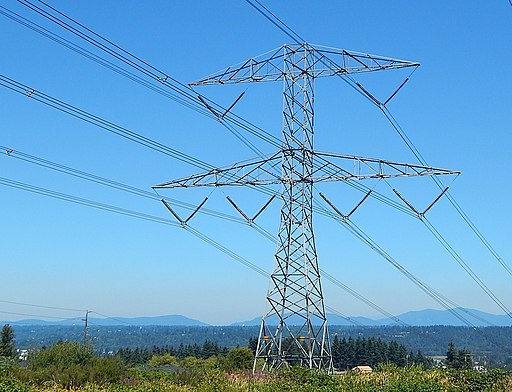
Photo by Ron Clausen, Creative Commons 1.0 Universal Public Domain Dedication
A quick headline roundup from the last couple of weeks:
“US Electric Grid Heading Toward ‘Crisis’ Thanks to AI Data Centers” (Common Dreams, January 2)
“US electricity grid stretches thin as data centers rush to turn on onsite generators” (tom’s HARDWARE, January 5)
“America’s Biggest Power Grid Operator Has an AI Problem — Too Many Data Centers” (Wall Street Journal, January 12)
Panicky political proposals to address the looming specter of grid failure under the strain of powering massive computer facilities, which in turn power massive artificial intelligence operations, range from charging data centers higher rates per kilowatt-hour to just plain banning the installations.
The only instance of helpful innovation I’m seeing from the political establishment comes from US Senator Tom Cotton (R-AR) who, Reason‘s Joe Lancaster reports, wants to exempt “in-house” utilities from federal regulatory red tape through legislation called the DATA Act.
Simply put, if Meta or Microsoft wanted to build their own generators, run its own power lines, etc., they’d save a lot of time and money … as long as their profane power sources didn’t burden the “grids” used by other energy production entities to serve other consumers over long distances.
It’s a great idea — and it’s an idea that would benefit everyone, not just data center operators.
As my kids might say (if they bothered themselves with such issues rather than just plugging their bazillion game consoles into the wall and ignoring such things while raising my electric bill) “grids are SOOOOOO 20th century.”
The idea of running power lines all over God’s green acre made a certain amount of sense in the 1930s. It makes no sense at all now.
When Congress created the Tennessee Valley Authority to bring electricity and other benefits that largely rural area of 80,000 square miles, and the Hoover Dam likewise generated electricity to serve far-flung metros in the west, generating significant amounts of energy, at reasonable costs, required large, expensive installations.
Once those installations were up and running, actually getting the power to homes, factories, etc. was a matter of stringing lines on poles and building out additional infrastructure (sub-stations, pole transformers, etc.).
Benefit: Everyone can flip a switch or turn a knob or plug an appliance into the wall and voilà! Power!
Costs: Running those lines and maintaining that infrastructure is expensive. Those lines and that infrastructure are vulnerable to everything from wind to lightning to drunk drivers to intentional sabotage, and their increasing interconnectedness just increases that vulnerability. Everyone is always one blown transformer or downed line or computer malfunction away from living in the 19th century for a little while (or perhaps having their houses burned down by a wildfire).
Even as those costs continue to rise — without additional benefit — all the talk seems to be of how to maintain the grids, how to improve the grids, how to maintain the grids.
Why?
As Rita Mae Brown points out, “insanity is doing the same thing over and over again but expecting different results.”
Along with the increase in grid-related problems, there’s been a corresponding increase in power generation solutions that don’t require large, expensive, centralized generation and sprawling grids to carry the energy.
Rooftop solar and backyard wind have advanced to the point where many, maybe even most, homes could function without “grid” connections at all.
The increasing safety and decreasing size of nuclear reactors make it possible to generate and distribute power at neighborhood, rather than regional, scale.
The only real beneficiaries of continued reliance on centralized generation and large-scale “grids” are the utilities which operate those power plants and those grids. They’re holding us back from what could be an era of cheap, clean, reliable energy.
It’s time to give up our grid addiction and pull our lips off the centralized utility teat. If we wise up and do that — possibly starting with passage of the DATA ACT — energy production and distribution can finally advance into the 21st century.
Thomas L. Knapp (X: @thomaslknapp | Bluesky: @knappster.bsky.social | Mastodon: @knappster) is director and senior news analyst at the William Lloyd Garrison Center for Libertarian Advocacy Journalism (thegarrisoncenter.org). He lives and works in north central Florida.
PUBLICATION/CITATION HISTORY


